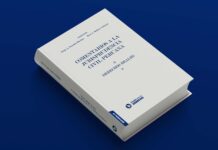Fundamentos destacados: 143. En la medida en que la demandante argumentó que había sido tratada médicamente contra su voluntad mientras estaba detenida, el Tribunal reitera que incluso una interferencia menor en la integridad física de un individuo debe considerarse una interferencia en el derecho al respeto a la vida privada según el artículo 8 si se lleva a cabo contra la voluntad del individuo (véase, entre otros , X c. Austria , no. 8278/78 , decisión de la Comisión de 13 de diciembre de 1979, DR 18, pág. 156; AB c. Suiza , no. 20872/92 , decisión de la Comisión de 22 de febrero de 1995, DR 80-B, pág. 70; y, mutatis mutandis , Herczegfalvy c. Austria, sentencia de 24 de septiembre de 1992, serie A, no. 244, pág. 26, § 86).
144. Para determinar si el tratamiento de la demandante con diversos medicamentos, que interferían con su integridad física, se llevó a cabo contra su voluntad, el Tribunal se remite a sus conclusiones respecto del artículo 5.1 del Convenio (véanse los párrafos 71 a 78 supra). Dado que la demandante no solo se resistió constantemente a permanecer en la clínica, sino que también se resistió a su tratamiento médico, de modo que en ocasiones tuvieron que administrársele medicamentos por la fuerza, el Tribunal concluye que recibió tratamiento médico contra su voluntad. Observa además que las conclusiones de al menos un perito (véase el párrafo 23 supra) indicaron que los medicamentos que la demandante había recibido en la clínica estaban contraindicados y habían causado graves daños a su salud. Sin embargo, el Tribunal no necesita determinar si el tratamiento de la demandante fue lege artis , ya que, independientemente de ello, se llevó a cabo contra su voluntad y, por lo tanto, ya constituyó una injerencia en su derecho al respeto de su vida privada.
150. El Tribunal, refiriéndose nuevamente a sus conclusiones relativas al artículo 5, párrafo 1 (véanse los párrafos 100-08 supra), considera que, en virtud de su obligación de garantizar a sus ciudadanos el derecho a la integridad física y moral, el Estado seguía teniendo el deber de ejercer la supervisión y el control sobre las instituciones psiquiátricas privadas. Observa también que, en materia de injerencias en la integridad física de una persona, la legislación alemana preveía sanciones retroactivas, siendo la agresión punible con hasta diez años de prisión en virtud de los artículos 223 a 226 del Código Penal. Además, una persona cuya integridad física hubiera sido perjudicada podía reclamar daños y perjuicios por daños pecuniarios y morales. Sin embargo, al igual que en los casos de privación de libertad, el Tribunal considera que dichas medidas retroactivas por sí solas no son suficientes para brindar una protección adecuada a la integridad física de las personas en una posición tan vulnerable como la del solicitante. Las conclusiones anteriores sobre la falta de control estatal efectivo sobre las instituciones psiquiátricas privadas en el momento pertinente (véanse los párrafos 103-108 supra) son igualmente aplicables a la protección de las personas contra las violaciones de su integridad física. Por consiguiente, el Tribunal concluye que el Estado demandado incumplió su obligación positiva de proteger a la demandante contra las injerencias en su vida privada, tal como lo garantiza el artículo 8, párrafo 1, del Convenio.
[Traducción de LP]
143. In so far as the applicant argued that she had been medically treated against her will while detained, the Court reiterates that even a minor interference with the physical integrity of an individual must be regarded as an interference with the right to respect for private life under Article 8 if it is carried out against the individual’s will (see, inter alia, X v. Austria, no. 8278/78, Commission decision of 13 December 1979, DR 18, p. 156; A.B. v. Switzerland, no. 20872/92, Commission decision of 22 February 1995, DR 80-B, p. 70; and, mutatis mutandis, Herczegfalvy v. Austria, judgment of 24 September 1992, Series A no. 244, p. 26, § 86).
144. In determining whether the applicant’s treatment with various medicines, which interfered with her physical integrity, was carried out against her will, the Court refers to its findings in respect of Article 5 § 1 of the Convention (see paragraphs 71-78 above). Given that the applicant not only constantly resisted her continued stay in the clinic, but equally resisted her medical treatment so that at times she had to be administered medication by force, the Court finds that she was given medical treatment against her will. It further notes that the findings of at least one expert (see paragraph 23 above) indicated that the medicines the applicant had received at the clinic had been contraindicated and had caused serious damage to her health. However, the Court does not need to determine whether the applicant’s treatment was lege artis, as, irrespective of this, it was carried out against her will and therefore already constituted an interference with her right to respect for her private life.
150. The Court, referring again to its findings concerning Article 5 § 1 (see paragraphs 100-08 above), considers that on account of its obligation to secure to its citizens their right to physical and moral integrity, the State remained under a duty to exercise supervision and control over private psychiatric institutions. It notes also that in the sphere of interferences with a person’s physical integrity, German law provided for retrospective sanctions, assault being punishable by up to ten years’ imprisonment under Articles 223 to 226 of the Criminal Code. Moreover, a person whose physical integrity had been harmed could claim damages in tort for pecuniary and non-pecuniary loss. However, just as in cases of deprivation of liberty, the Court finds that such retrospective measures alone are not sufficient to provide appropriate protection of the physical integrity of individuals in such a vulnerable position as the applicant. The above findings as to the lack of effective State control over private psychiatric institutions at the relevant time (see paragraphs 103-08 above) are equally applicable as far as the protection of individuals against infringements of their physical integrity is concerned. The Court therefore concludes that the respondent State failed to comply with its positive obligation to protect the applicant against interferences with her private life as guaranteed by Article 8 § 1 of the Convention.
[Idioma original]
CASE OF STORCK v. GERMANY
STRASBOURG
16 June 2005
FINAL
16/09/2005
In the case of Storck v. Germany,
The European Court of Human Rights (Third Section), sitting as a Chamber composed of:
Mr I. Cabral Barreto, President,
Mr G. Ress,
Mr L. Caflisch,
Mr R. Türmen,
Mr B. Zupančič,
Mrs M. Tsatsa-Nikolovska,
Mrs A. Gyulumyan, judges,
and Mr V. Berger, Section Registrar,
Having deliberated in private on 26 October 2004 and 24 May 2005,
Delivers the following judgment, which was adopted on the last-mentioned date:
PROCEDURE
1. The case originated in an application (no. 61603/00) against the Federal Republic of Germany lodged with the Court under Article 34 of the Convention for the Protection of Human Rights and Fundamental Freedoms (“the Convention”) by a German national, Ms Waltraud Storck (“the applicant”), on 15 May 2000.
2. The applicant, who had been granted legal aid, was represented by Mr G. Rixe, a lawyer practising in Bielefeld. The German Government (“the Government”) were represented by their Agent, Mr K. Stoltenberg, Ministerialdirigent, and, subsequently, Mrs A. Wittling-Vogel, Ministerialrätin, of the Federal Ministry of Justice.
3. The applicant alleged, in particular, that her confinement in different psychiatric hospitals and the medical treatment she had received had violated Articles 5 and 8 of the Convention. She also complained that the proceedings to review the legality of these measures had not satisfied the requirements of Article 6 of the Convention.
4. On 15 October 2002 a committee of three judges of the Court, pursuant to Article 28 of the Convention, declared the application inadmissible and rejected it in accordance with Article 35 § 4.
5. On 28 January 2003 the same committee decided to reopen the proceedings.
6. The application was then allocated to the Third Section of the Court (Rule 52 § 1 of the Rules of Court). Within that Section, the Chamber that would consider the case (Article 27 § 1 of the Convention) was constituted as provided in Rule 26 § 1.
7. By a decision of 26 October 2004, the Chamber declared the application partly admissible.
8. The applicant and the Government each filed observations on the merits (Rule 59 § 1). The parties replied in writing to each other’s observations.
9. On 1 November 2004 the Court changed the composition of its Sections (Rule 25 § 1), but this case remained with the Chamber constituted within the former Third Section.
THE FACTS
I. THE CIRCUMSTANCES OF THE CASE
10. The applicant was born on 30 August 1958 and lives in Niederselters (Germany).
A. Background to the case
11. The case concerns the applicant’s repeated placement in a psychiatric institution, her stay in a hospital, her medical treatment and her various compensation claims.
12. The applicant is currently 100% disabled and receives an invalidity pension. She claims to be constantly suffering from significant pain, especially in her arms and legs and her vertebral column. She has spent almost twenty years of her life in different psychiatric institutions and other hospitals.
1. The applicant’s placement in different psychiatric institutions
13. From January 1974 to May 1974 (at which time the applicant was 15 years old), and from October 1974 to January 1975 (when she was 16 years old), the applicant was placed in the children and young people’s psychiatric department at Frankfurt am Main University Clinic for seven months at her father’s request.
14. From 29 July 1977 (when she was 18 years old) to 5 April 1979, she was placed in a locked ward (geschlossene Station) at a private psychiatric institution, the clinic of Dr Heines in Bremen, at her father’s request. There had been serious conflicts between the applicant and her parents, following which her father believed her to be suffering from a psychosis. The applicant’s mother had suffered from a paranoid-hallucinatory psychosis.
15. The applicant – who by that time had attained the age of majority – had not been placed under guardianship, had never signed a declaration that she had consented to her placement in the institution, and there had been no judicial decision authorising her detention in a psychiatric hospital. The private clinic of Dr Heines was not entitled to detain patients who were to be kept in accordance with the Act of the Land of Bremen on the detention of mentally insane persons, mentally deficient persons and drug addicts (see paragraphs 51-58 below). On 4 March 1979 the police brought the applicant back to the clinic by force after she had attempted to escape.
16. During her forced stay at that clinic, the applicant was unable to maintain regular social contact with persons outside the clinic. When she was three years old, she had fallen ill with poliomyelitis, and following her medical treatment at the clinic she developed post-poliomyelitis syndrome.
17. From 5 April 1979 to 21 May 1980, the applicant was placed in a psychiatric hospital in Gießen. She claimed that she had by chance been saved from having to stay there any longer by a patient in the hospital who had given her accommodation.
18. From 21 January to 20 April 1981, she again received medical treatment at Dr Heines’s clinic, having at that time lost her ability to speak and, according to the doctors, showing signs of autism.
2. The applicant’s stays in different hospitals and clinics
19. On 7 May 1991 the applicant received medical treatment at Dr Horst Schmidt’s clinic for neurology and psychiatry.
20. From 3 September 1991 to 28 July 1992, the applicant received medical treatment (stationäre Behandlung) at Mainz University Clinic for Psychosomatic Medicine and Psychotherapy, a public-law institution, where she regained her ability to speak.
[Continúa…]
![Cuando el uniforme pesa más que la maternidad: La identificación de estereotipos de género en el fuero policial y castrense que obstaculiza el derecho a la maternidad justifica el dictado de medidas de protección [Exp. 10278-2025-2-3205-JR-FT-01]](https://img.lpderecho.pe/wp-content/uploads/2022/07/mujer-policia-LPDerecho-218x150.png)
![Ante la duda respecto de la comisión de los delitos imputados se debe optar por esclarecerlos en juicio [Exp. 00951-2022-4-1826-JR-PE-01]](https://img.lpderecho.pe/wp-content/uploads/2025/10/MAZO-LIBRO-JUEZ-LEY-LPDERECHO-218x150.jpg)

![Ley 31751 no es inconstitucional en abstracto, sino solo cuando se aplica a delitos graves o más graves, en los que el plazo fijo de un año de suspensión de la prescripción resulta desproporcionado (aplicación de distinguishing respecto del AP 5-2023/CIJ-112) [Casación 2298-2022, Arequipa, f. j. 21]](https://img.lpderecho.pe/wp-content/uploads/2025/07/MAZO-JUEZ-DOCUMENTO-LPDERECHO-218x150.jpg)
![Trabajador 276 pierde nombramiento por apelar un informe no impugnable y no el resultado final [Res. 005142-2025-Servir/TSC-Segunda Sala]](https://img.lpderecho.pe/wp-content/uploads/2024/04/dormir-trabajo-despido-vacaciones-desacanso-horas-libres-feriado-trabajador-formal-extras-laboral-LPDerecho-218x150.jpg)

![Ley Orgánica del Registro Nacional de Identificación y Estado Civil (Ley 26497) [actualizada 2025]](https://img.lpderecho.pe/wp-content/uploads/2025/05/Ley-organica-del-registro-nacional-de-identificacion-y-estado-civil1-LPDERECHO-218x150.jpg)


















![[Nuevo criterio] TC: Ley penitenciaria aplicable es la vigente al momento en que la condena quedó firme [Exp. 04235-2023-PHC/TC]](https://img.lpderecho.pe/wp-content/uploads/2023/03/tribunal-constitucional-fachada-exterior-tc-1-LPDerecho-218x150.png)
![Modifican el Reglamento de la Ley del Impuesto a la Renta sobre nuevos métodos de precios de transferencia [Decreto Supremo 302-2025-EF]](https://img.lpderecho.pe/wp-content/uploads/2022/01/Derecho-Tributario-impuestos-tributos-LP-218x150.jpg)

![Aprueban valor de la UIT para el año 2026 [Decreto Supremo 301-2025-EF]](https://img.lpderecho.pe/wp-content/uploads/2024/04/dinero-dolar-sube-afp-billete-LPDerecho-218x150.jpg)

![Código Penal peruano [actualizado 2025]](https://img.lpderecho.pe/wp-content/uploads/2024/05/VENTA-CODIGO-PENAL-LPDERECHO-218x150.jpg)
![Código de Protección y Defensa del Consumidor (Ley 29571) [actualizado 2025] Codigo proteccion defensa consumidor - LPDercho](https://img.lpderecho.pe/wp-content/uploads/2024/05/Codigo-proteccion-defensa-consumidor-LPDercho-218x150.png)
![Decreto Legislativo del Notariado (Decreto Legislativo 1049) [actualizado 2025]](https://img.lpderecho.pe/wp-content/uploads/2025/10/DECRETO-LEGISLATIVO-NOTARIO-1049-2025-LPDERECHO-218x150.jpg)
![Ley General de Contrataciones Públicas [Ley 32069] (actualizada 2025)](https://img.lpderecho.pe/wp-content/uploads/2025/01/NUEVA-LEY-GENERAL-CONTRATACIONES-PUBLICAS-LPDERECHO-218x150.png)
![Ley Orgánica de Elecciones (Ley 26859) [actualizada 2025]](https://img.lpderecho.pe/wp-content/uploads/2025/05/Ley-organica-de-elecciones-LPDerecho-2025-218x150.jpg)






![[VÍDEO] ¿Quieres postular a la Fiscalía? Estas son las preguntas que hacen en las entrevistas](https://img.lpderecho.pe/wp-content/uploads/2021/10/postular-fiscalia-preguntas-entrevista-LP-218x150.jpg)



![EXP. N.° 0022-2009-PI/TC LIMA GONZALO TUANAMA TUANAMA Y MÁS DE 5000 CIUDADANOS SENTENCIA DEL TRIBUNAL CONSTITUCIONAL En Lima, a los 09 días del mes de junio de 2010, el Tribunal Constitucional en sesión de Pleno Jurisdiccional, con la asistencia de los magistrados Mesía Ramírez, Beaumont Callirgos, Vergara Gotelli, Landa Arroyo, Calle Hayen, Eto Cruz y Álvarez Miranda, pronuncia la siguiente sentencia con los fundamentos de voto de los magistrados Vergara Gotelli y Landa Arroyo, que se agregan. ASUNTO Demanda de Inconstitucionalidad interpuesta por Gonzalo Tuanama Tuanama, en representación de más de 5000 ciudadanos contra el Decreto Legislativo N.° 1089. DEMANDA Y CONTESTACIÓN a) Demanda contra el Decreto Legislativo N.° 1089, que regula el Régimen Temporal Extraordinario de Formalización y Titulación de Predios Rurales Con fecha 01 de julio de 2009, se interpone demanda de inconstitucionalidad contra el Decreto Legislativo N.° 1089, que regula el Régimen Temporal Extraordinario de Formalización y Titulación de Predios Rurales, publicada en el diario oficial El Peruano el 28 de junio de 2008. Los demandantes refieren que “'sin entrar al fondo del contenido de la norma”, ésta fue promulgada sin efectuar ninguna consulta previa e informada a los pueblos indígenas, tal como lo ordena el Convenio 169 de la Organización Internacional De Trabajo (OIT), afectándose con ello los derechos fundamentales de los pueblos Indígenas, como el derecho a la consulta previa y el derecho colectivo al territorio ancestral, establecidos en los artículos 6, 15, 17 del mencionado convenio. De igual forma, expresan que no se tomaron en cuenta los artículos 19, 30 y 32 de la Declaración de las Naciones Unidas sobre los Derechos de los Pueblos Indígenas (DNUDPI) aprobado por la Asamblea General de la Organización de Naciones Unidas. Alegan que con dicha norma se afectan otros derechos establecidos en el Convenio N.° 169, como el derecho sobre las tierras de los pueblos indígenas (artículos 13 al 19), en el considerando que no se tomaron en cuenta medida que garanticen la protección de sus derechos de propiedad y posesión. Refieren que se afecta también el derecho a la libre determinación de las comunidades nativas, previsto en el artículo 17 del Convenio, que declara el respeto de sus formas tradicionales de transmisión de sus territorios. Por último, alegan que se estaría vulnerando lo previsto en el artículo 19 del Convenio en cuanto se afecta el derecho al desarrollo de políticas agrarias adecuadas para los pueblos indígenas. [Continúa...] Descargue la resolución aquí](https://img.lpderecho.pe/wp-content/uploads/2023/01/Logo-LP-con-fondo-guinda-LPDERECHO-1068x561.png)


![Usurpación: El bien jurídico protegido es la posesión física; por lo tanto, el sujeto pasivo es quien se encuentra en posesión directa del inmueble, sin que sea relevante el título [Casación 1592-2024, Lambayeque, f. j. 2.7]](https://img.lpderecho.pe/wp-content/uploads/2025/10/MAZO-JUEZ-SENTENCIA-PENAL-LPDERECHO-218x150.jpg)
![Multan a Win por publicidad engañosa al afirmar que ofrece el internet «más rápido del mercado» con «la mejor conexión que nunca se cae» [Res. 233-2025/CCD-Indecopi]](https://img.lpderecho.pe/wp-content/uploads/2025/07/indecopi-exterior-10-anos-LPDerecho-324x160.jpg)
![Aprueban valor de la UIT para el año 2026 [Decreto Supremo 301-2025-EF]](https://img.lpderecho.pe/wp-content/uploads/2024/04/dinero-dolar-sube-afp-billete-LPDerecho-100x70.jpg)


![Juez ejecuta sanción de amonestación a abogado Elio Riera por «quebrantamiento de la lex artis al formular recusación con manifiesta contravención al procedimiento» [Exp. 04633-2021-19]](https://img.lpderecho.pe/wp-content/uploads/2025/10/ELIO-RIERA-DOCUMENTO2-LPDERECHO-100x70.jpg)

![Cuando el uniforme pesa más que la maternidad: La identificación de estereotipos de género en el fuero policial y castrense que obstaculiza el derecho a la maternidad justifica el dictado de medidas de protección [Exp. 10278-2025-2-3205-JR-FT-01]](https://img.lpderecho.pe/wp-content/uploads/2022/07/mujer-policia-LPDerecho-100x70.png)


![Ante la duda respecto de la comisión de los delitos imputados se debe optar por esclarecerlos en juicio [Exp. 00951-2022-4-1826-JR-PE-01]](https://img.lpderecho.pe/wp-content/uploads/2025/10/MAZO-LIBRO-JUEZ-LEY-LPDERECHO-100x70.jpg)
![Multan a Win por publicidad engañosa al afirmar que ofrece el internet «más rápido del mercado» con «la mejor conexión que nunca se cae» [Res. 233-2025/CCD-Indecopi]](https://img.lpderecho.pe/wp-content/uploads/2025/07/indecopi-exterior-10-anos-LPDerecho-100x70.jpg)





![TC reitera criterio sobre la naturaleza no remunerativa del bono por función fiscal [Exp. 00742-2019-PA/TC]](https://img.lpderecho.pe/wp-content/uploads/2022/03/Ministerio-Publico-Peru-fachada-MP-fiscalia-nacion-LPDerecho-324x160.png)